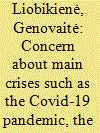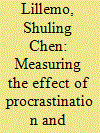| Srl | Item |
| 1 |
ID:
176743


|
|
|
|
|
| Summary/Abstract |
This paper intends to examine the key drivers of household environmental attitudes and energy-saving behavior using both observed and stated attitudinal factors. Beginning with an assessment of energy-saving behaviors Item Response Theory (IRT), we associate hierarchical multivariate regression with an innovative variable selection approach via Elastic Net Selection (ENS). Our empirical study is based on data from the 2012 ENERGIHAB project survey. Empirical evidence in this article contributes with new insights about the main explanatory factors of household energy-saving behavior. The main results further suggest that energy-saving behavior tends to fluctuate throughout time in households. Our findings and approach generate broader methodological insights into energy efficiency analysis through behavioral aspects.
|
|
|
|
|
|
|
|
|
|
|
|
|
|
|
|
| 2 |
ID:
191387


|
|
|
|
|
| Summary/Abstract |
The number of crises experienced around the world forces people to reconsider and reassess various aspects of their lives. The energy crisis caused by the war in Ukraine and uncontrolled climate change revealed the importance of energy-saving behavior. Thus, the aim of this paper is to analyze the concerns about current crises such as the Covid-19 pandemic, the war in Ukraine, and climate change's impact on energy-saving behavior and changes in environmental concern. Referring to the survey conducted in Lithuania in 2022, where 1000 respondents participated, the results revealed that the war in Ukraine was the most concerning problem. The level of climate change concern was slightly lower. Meanwhile, the Covid-19 pandemic was the least important problem in Lithuania in 2022. Furthermore, respondents stated that the Covid-19 pandemic contributed to the changes in environmental concern and energy-saving actions more than the war in Ukraine did. Meanwhile, the Generalized Linear Model results revealed that only the war in Ukraine positively and significantly influenced energy-saving behavior. The Covid-19 pandemic concern negatively affected energy-saving behavior, while the climate change concern factor affected it indirectly, as the interaction of attitudes toward energy consumption. Thus, this study revealed the main aspect of and how to encourage energy-saving behavior in the context of the main current crises.
|
|
|
|
|
|
|
|
|
|
|
|
|
|
|
|
| 3 |
ID:
127905


|
|
|
|
|
| Publication |
2014.
|
| Summary/Abstract |
A common finding in behavioural economics is that people often procrastinate, i.e., keep postponing planned tasks or decisions that require effort to execute. The effect of procrastination on inter-temporal energy choice behaviours could be even more serious because energy is an abstract, invisible and intangible commodity. This paper uses a web survey to investigate how people's procrastination propensity and environmental awareness affect their heating-energy-saving behaviours. The results indicate that people who state that they have a higher tendency to procrastinate are significantly less likely to have engaged in most of the heating energy-saving activities, especially regarding larger purchases or investments in equipment and the insulation of doors and windows. I also found a positive relationship between environmental awareness and engaging in everyday energy-saving activities such as reducing the indoor temperature. The findings suggest that measures aimed at reducing procrastination are needed to realise energy-saving potential. It is important to find ways to either bring future benefits closer to the present or to magnify the costs of delayed action. For example, one can employ certain feedback systems and commitment devices to make current gains and future costs more visible or tangible.
|
|
|
|
|
|
|
|
|
|
|
|
|
|
|
|
| 4 |
ID:
186420


|
|
|
|
|
| Summary/Abstract |
Based on an experiment on urban residents in China, this study analyzes the influence of differently framed messages on energy-saving behaviors. It is the first to study the effect of scale framing (large vs. small scale) and the interaction effects between scale and benefit framing (environmental vs. monetary benefit) on energy-saving behaviors. The study also analyzes the mediating effect of attitude, and the moderating effect of contextual factors. Data was collected from 1280 Chinese residents and was analyzed using a structural equation model. The results indicate that scale framing has significant effects on energy-saving usage behavior both directly and indirectly. However, the environmental or monetary benefit of saving energy surprisingly makes no difference to urban residents. Interestingly, in the monetary framing, large-scale messages can significantly promote energy-saving usage behavior compared to small-scale ones, while the differences are not significant in the environmental framing. Among the contextual factors, individual income and education level have significant moderating effects on several paths in our theoretical model. Finally, the theoretical and practical implications for energy-saving behavior promotion are discussed.
|
|
|
|
|
|
|
|
|
|
|
|
|
|
|
|